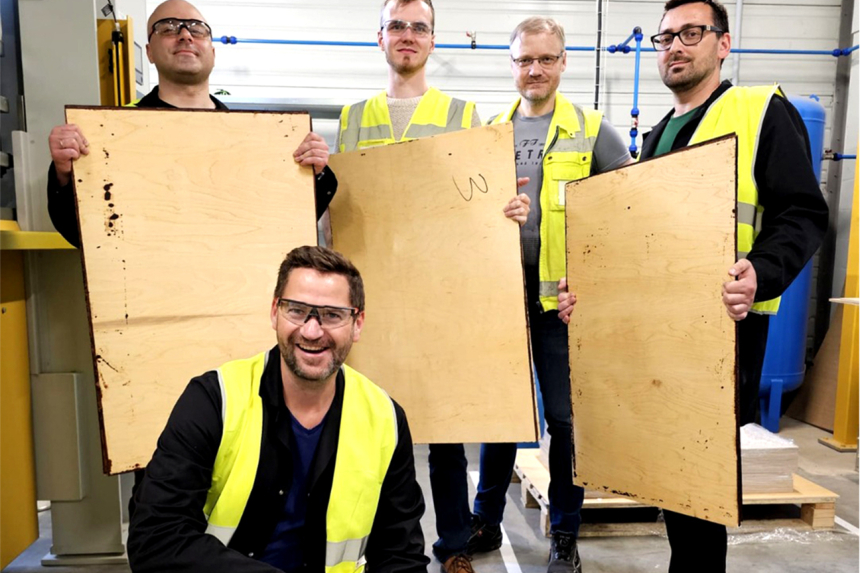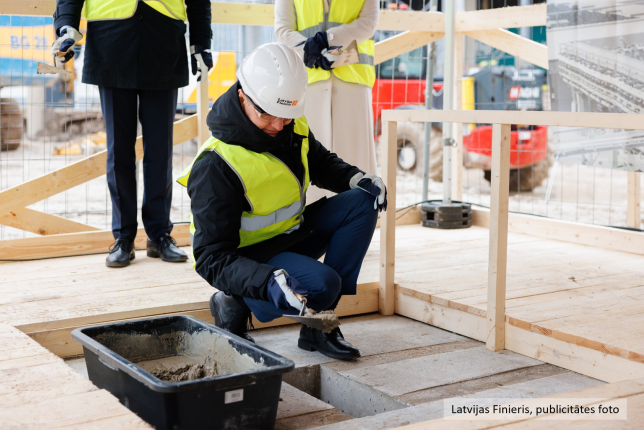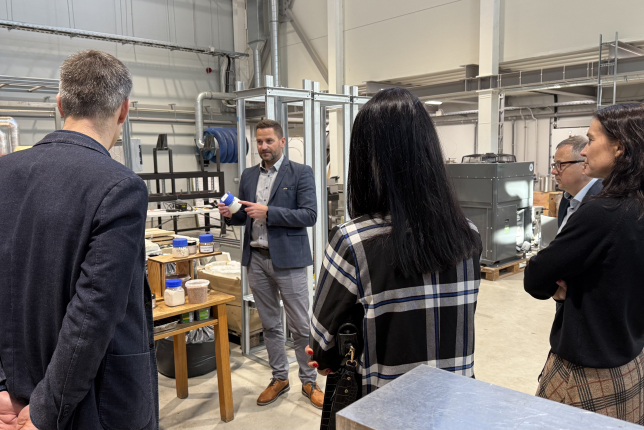From Bark to Water Resistance: How LSIWC Scientists Are Transforming the Plywood Industry

The Latvian State Institute of Wood Chemistry (LSIWC), in collaboration with AS Latvijas Finieris, has achieved a breakthrough in the wood processing industry that has been sought for decades — the development of an innovative, 100% bio-based adhesive, which for the first time in history has enabled birch plywood to achieve 1st class water resistance (EN 314-2) under industrial conditions.
The adhesive is based on a specially formulated mixture of birch bark suberinic acids and ligno-carbohydrates, tailored to meet standard industrial plywood pressing parameters.
The Need for a Safer and More Sustainable Alternative
Until now, high water resistance in plywood has traditionally relied on formaldehyde-based adhesives, which, according to the U.S. Environmental Protection Agency (EPA) and the European Chemicals Agency (ECHA), are classified as toxic, potentially carcinogenic, and emit volatile organic compounds (EPA, 2022 | ECHA, Substance Information – Formaldehyde).
The EU REACH regulation has formally restricted the use of formaldehyde in construction materials since 2014, and the European Commission’s Circular Economy Action Plan (2023) calls for an accelerated transition to non-toxic material cycles. (EC Circular Economy Action Plan, 2023).
A Natural Adhesive from Birch Bark
What makes this achievement unique:
the adhesive is 100% bio-based;
high water resistance was achieved at realistic industrial pressing temperatures;
the pressing conditions are easily scalable;
the adhesive can be applied using existing industrial gluing equipment, successfully tested at Latvijas Finieris production facilities;
the first large-scale plywood samples have already been obtained.
The technology is based on birch bark — a by-product of plywood production — and contributes to significant waste reduction and improved raw material utilization.
Research Team and Collaboration
We extend our sincere thanks to the Biorefinery Laboratory team at LSIWC — Dr. Jānis Rižikovs, Dr. Aigars Pāže, M.Sc. Rūdolfs Bērziņš, M.Sc. Guntis Sosins, and Ph.D. Daniela Godiņa — for developing and adapting the technology for industrial application.
We are also grateful to AS Latvijas Finieris for their courage, interest, and trust in developing this innovation to the point where industrial implementation is already under consideration. Special thanks to the team at Latvijas Finieris — Artūrs Raimonds Feldmanis, Uldis Zeltiņš, Arta Paula Ozoliņa, Jevgēņijs Visockis, and Ainārs Bobulis — for their excellent collaboration, industrial insight, and support in scaling the laboratory technology.
Sector and Market Potential
According to market studies, the European wood-based panel market has grown from approximately €40 billion in 2022 to more than €45 billion by 2024 (Grand View Research 2023-2030, Market Data Forecast 2025-2033, Global Market Insights 2025-2034). This innovation is directly aligned with the objectives of the European Green Deal and the Construction Products Regulation, which call for the use of non-toxic, renewable, and circular-economy-compatible materials.
The Latvian-developed method stands out for its:
use of internal industry by-products (birch bark);
elimination of additional synthetic chemical additives;
compatibility with standard industrial equipment;
compliance with the EN 314-2 international water resistance standard.
International Context and Future Outlook
The European Commission’s Bioeconomy Strategy (2018) emphasizes the need to support high-performance, locally sourced bio-based technologies — from national innovation policies to EU-level investment instruments. (EC Bioeconomy Strategy, 2018).
Similarly, the Organisation for Economic Co-operation and Development (OECD) notes that low-carbon wood-based materials will become key building components of the 21st century, particularly in the context of sustainable urban development. (OECD: Bio-based and Low-carbon Construction, 2023).
In this context, the natural adhesive developed by our scientists represents a new direction, grounded in the synergy of science, industry, and circular economy principles. It offers not only a safe and sustainable alternative to conventional materials, but also a scalable, export-ready solution that contributes to Latvia’s leadership in the future European bioeconomy.
Project information
The research activities are implemented within the framework of the contract No. 5.1.1.2.i.0/1/22/A/CFLA/007, concluded on January 20, 2023, between SIA "Forest Sector Competence Centre" and the Central Finance and Contracting Agency of the Republic of Latvia.


